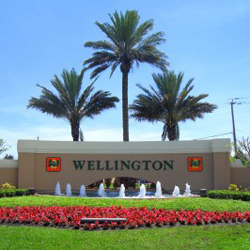Wellington’s Equestrian Preserve Committee discussed Palm Beach County’s efforts at equine manure recycling last week.
At the Feb. 1 meeting, Committee Chair Jane Cleveland asked Wellington Projects Manager Mike O’Dell to explain a recent action by the Palm Beach County Commission to allow manure recycling facilities nearby.
O’Dell, who spoke at the commission meeting in favor of an equine manure recycling project, said the county approved a pilot program allowing recycling companies to develop such facilities within the Glades Tier, which encompasses the sugar cane fields from 20-Mile Bend west to the urban areas of Belle Glade and Pahokee.
“There is one company that is going through that right now, that’s the old sugar mill office at State Road 880,” O’Dell said, adding that a hearing is set for that project later this month. “The idea is to promote the disposal of livestock waste through some of the new technologies and methodologies that are out there.”
He said the county is looking within its codes to identify projects that are environmentally friendly, are self-contained and advance the use of that material for some other purpose than composting.
“Although composting is a component, within our watershed area we’re trying to remove phosphorus and other nutrients from our groundwater, so this program was set up as a pilot program, and the county staff has been working with all the agencies to put the program together,” O’Dell said. “Everybody was at the table this past summer putting this program together. It has been 15 years in the making.”
He credited Palm Beach County Vice Mayor Melissa McKinlay and her staff as key players in bringing all the necessary agencies to agree on the project.
“Although it’s a small step, it’s a step in the right direction, and I’m looking forward to continuing to work with the county staff to make this happen,” O’Dell said. “Hopefully we will have successful end users, and we can find other alternatives to dispose of this material.”
Cleveland said equine waste disposal is an important issue for Wellington and asked about the village’s impact compared with the entire county.
O’Dell said there is no way of knowing how many horses there are in Palm Beach County, but there are estimates based on a horse-per-acre scenario.
“In Wellington we’ve got roughly 12,000 horses that appear here during the equestrian season,” he said, adding that the volume remains at between 3,000 and 5,000 in the off season. “As people stay here more permanently, we’re finding more and more people are calling Wellington their home base.”
About 60 percent of Wellington’s equine waste is generated during the equestrian season with 40 percent in the off season.
“We’re producing somewhere in the neighborhood of 100,000 tons just in Wellington alone, and that’s with 12,000 or so horses,” O’Dell said. “If you look at Palm Beach County, we’re estimating that there’s about 27,000 to 28,000 horses. So, conservatively, we’re half. On those terms there’s about 200,000 tons being generated on a yearly basis.”
He said the Solid Waste Authority will stop taking livestock waste in five years. McKinlay noted at the county meeting that U.S. Sugar, which has been taking equine waste for composting, is also planning to pull out.
“We have a window that says that in a five-year period we’re probably going to see the waning off of the Solid Waste Authority taking any of this, so we need to come up with an end user, so it’s very important that we move this forward,” O’Dell said.
He explained that U.S. Sugar, which has been taking equine waste for composting, has been instructed by its management agencies to come up with a nutrient management plan that makes it difficult to take in more of the equine material.
“Since that operation started, which was new, there’s a tipping fee associated with that,” he said, explaining that U.S. Sugar had previously taken equine waste with no tipping fee. “There’s a tipping fee associated with almost every operation we know of right now that’s out there, so those are the costs that you’ll see that get passed to you as farm owners to move this stuff into other locations.”
O’Dell said bringing in end users close to the concentration of horses in the State Road 80 corridor might see a cost increase, but it would stabilize.
“I think that is what we’re bringing to bear on the market, to see that as quickly as we can bring stabilization to the marketplace, but also bring up that end user that is the answer to our problem,” he said, adding that it has been suggested to the county that there are four or five providers that have good business plans.
“They are good stewards of the land, and they are good stewards for our farm owners and operators, and I think that that’s what we’re trying to bring into our marketplace,” he said.
In other business, the committee continued its review of the revisions to the village’s land development regulations.
Planning & Zoning Manager David Flinchum said the shortened and revised draft code will go through all the village’s boards and the Wellington Village Council for input before going through the boards again for review before final adoption.
“I think the code will be 40 percent of what it was,” Flinchum said. “Our goal is to look at what’s outdated, and look at stuff we’re never going to do out here in Wellington. There was a lot of legalese in the code that we don’t need.”
The end goal of the project is to get Wellington ready for the future.
“The review takes up the fact that we’re now in a redevelopment mode,” he explained. “We don’t have a lot of large, vacant parcels, which most of the regulations were built for. Now we need to have incentives built in and stay current of new trends like mixed uses and all the stuff you guys may have been hearing about in different municipalities.”








